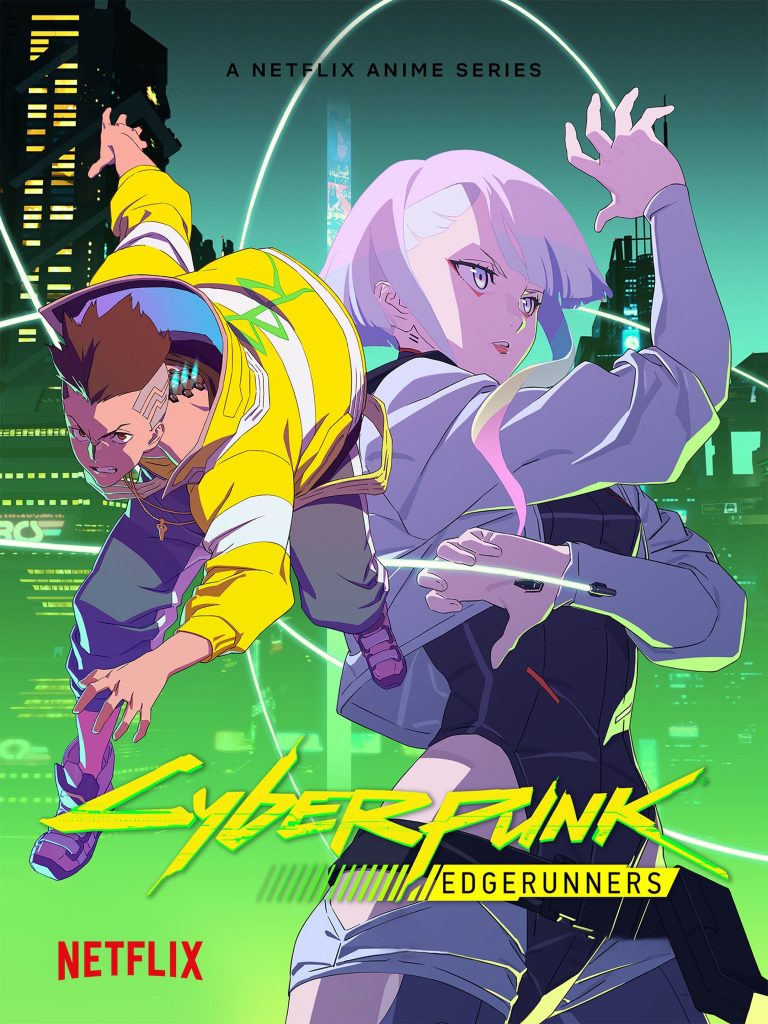
“Cyberpunk: Edgerunners,” a Netflix-produced anime miniseries that spins off of CD Projekt RED’s contentious video game “Cyberpunk 2077,” had a lot to live up to after the disappointing launch of the video game it draws its world from. This pressure to perform was similarly only heightened by the big names in its cast and crew, such as Giancarlo Esposito of “Breaking Bad” and “Better Call Saul” and Hiroyuki Imaishi, director of “Gurren Lagann.” With many fans hoping to see a more crafted vision of Night City than was on display in 2077, and newcomers to the genre intrigued by a new Studio Trigger project, the most pertinent question asked about the show remains — does it live up to the hype? Although it exists as part of a universe known for its extreme and stylish presentation and in-your-face attitude, the answer is a surprisingly soft yes.
Briskly telling the story of David Martinez, a poor teenager who aspires for a life beyond the slum he and his mother live in, “Cyberpunk: Edgerunners” makes the smart choice of focusing on a character that is immediately more relatable than legendary figures like V or Johnny Silverhand. Furthermore, as Martinez loses his mother and joins a found-family group of mercenaries — referred to within the narrative as “cyberpunks” or the titular Edgerunners — the show never loses sight of this human element, portraying each character as distinctly and eminently likable, even if they lack some depth. While the plot beats are well-trodden, the show excels at tapping into the personality-ridden elements that have kept cyberpunk as a prominent subgenre of sci-fi for over 40 years.
Personality is truly where Edgerunners shines. Its setting nails the grimy, techno-centric, hyper-capitalist dystopia of Night City, while adding new depth to its appearance in “Cyberpunk 2077.” Seeing Martinez’s ragtag gang drive by glitzy holograms, shoot their way through claustrophobic gang hideouts and relax under the light of neon advertisements is dazzling in its own right, and provides a new perspective on familiar territory for 2077 players. Likewise, the show’s animation nails the gore of Night City, with Studio Trigger doing an excellent job at portraying the everyday, over-the-top violence that characterizes the lives of so many of the city’s denizens. Bolstering the anime’s visuals is its soundtrack, combining an eclectic and vibrant mix of pop, electronic, rap, rock and metal sounds to further add to the distinctiveness of Martinez’s journey. In combination, the show’s presentation deftly manages to do right by the world that cyberpunk progenitor Mike Pondsmith envisioned, carving out its own striking identity and enhancing the identity of 2077.
However, in the process, “Cyberpunk: Edgerunners” may have taken the genre’s motto of “style over substance” too far. Its characters are all memorable and easy to attach oneself to, but they remain examples of a dozen or so cliche archetypes. Martinez’s struggle with the cybernetic implants he needs to achieve his dreams and the increasing mental toll they take on him is a compelling conflict. The conflict expands its presence in “Cyberpunk 2077,” but remains largely static nonetheless, especially with Martinez continuously pushing himself to the edge under the guise of fulfilling his promises to lost comrades — and his belief in himself as special because of his tolerance for cyberware. Its themes are similarly interesting but are largely impeded by the show’s relatively generic story.
Overall, Edgerunners has succeeded in several places where its video game counterpart failed, but the two ultimately face the same issue. Behind the robot limbs, cyberspace sequences, corporate wars and cop car explosions, “Edgerunners” is a fun, short, average story that is buoyed by an enthralling aesthetic that CD Projekt RED is still yet to wield with the same focus and expertise that all-time greats like “Blade Runner” or “Neuromancer” have.
Rating: 3.6 out of 5 stars


